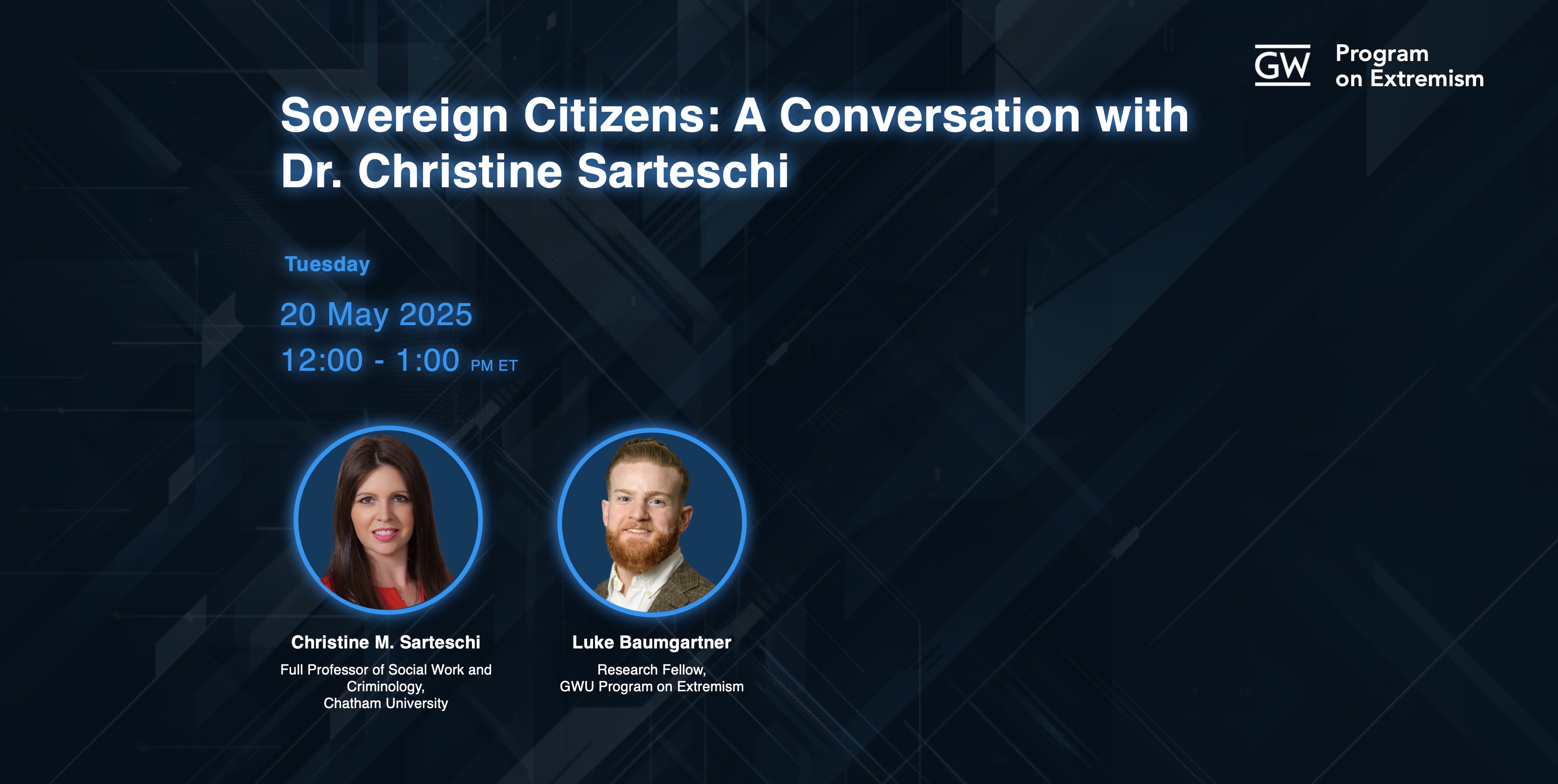Sovereign Citizens: A Conversation with Dr. Christine Sarteschi

Originally derived from the tax protest and Posse Comitatus movement of the 1960s, sovereign citizens present a complex challenge to law enforcement and extremism researchers alike. As such, the Program on Extremism proudly hosted Dr. Christine Sarteschi, Professor of Social Work and Criminology at Chatham University and a leading expert on the sovereign citizen movement, for a virtual discussion that explored the ideology, tactics, and evolving threat posed by this anti-government movement. This fascinating and thought-provoking event was moderated by Research Fellow Luke Baumgartner.
On May 20, 2025, the Program on Extremism (PoE) at The George Washington University hosted a virtual discussion on the sovereign citizen movement. The event featured Dr. Christine Sarteschi, a leading expert on sovereign citizens and professor of Social Work and Criminology at Chatham University. Luke Baumgartner, a Research Fellow at PoE, moderated the conversation.
According to the Anti-Defamation League (ADL), the sovereign citizen movement is a large anti-government extremist ideology found mainly in English-speaking common law countries, including the United States, Canada, Australia, New Zealand, and the United Kingdom. Sovereign citizens, followers of the movement, believe the government is the illegitimate product of a conspiracy that subverted the original, lawful government. As a result, sovereign citizens believe the government has no jurisdiction or authority over them. Hence, sovereign citizens claim that they are not subject to governmental authority and are not bound by its laws. Sovereigns engage in criminal activity, including harassment and retaliatory tactics known as “paper terrorism,” scams and frauds, and even violence. Dr. Sarteschi described them as a decentralized, loose group of people who pick and choose which laws to follow. As for what the term “sovereign” means, Dr. Sarteschi explained that some people claim to be a citizen of their state or locality, but not the country. Some even go so far as to issue their own special passports, claiming diplomatic immunity. While not defined by a primary religious affiliation, many adherents are Christian.
The movement originated in the 1950s during the U.S. tax protest movement. Dr. Sarteschi noted that periods of financial instability or social unrest tend to increase interest in the movement. More recently, social media and the internet have facilitated the proliferation of sovereign citizen ideology and messaging nationally and internationally. During COVID-19, the movement became more popular as government public health mandates inflamed anti-government sentiments. While the movement is distinct, it overlaps with other extremist mainstream ideologies, such as QAnon.
Dr. Sarteschi got involved in researching this movement nearly a decade ago through YouTube. She was interested in their persistent and undeterred engagement with law enforcement in confrontational and legally dubious ways, and their resolve to maintain their tactics despite repeated failure. She credits the “revolving door” of new ideas and people into the movement for its resilience.
Sovereign Citizens also use social media to sell goods and products related to the movement. Influencers and gurus market merchandise and downloadable forms that promise exemption from the law. Platforms such as X, YouTube, Telegram, Rumble, TikTok, and Facebook serve as marketplaces for these products. Dr. Sarteschi cited individuals like Anna Von Reitz, Brandon Joe Williams, and the self-proclaimed “Queen of Canada” Romana Didulo as notable figureheads, who propagate and profit from the ideology.
Although the sovereign citizen movement is not formally classified as a terrorist organization, its followers employ tactics that can significantly disrupt government functions, including “paper terrorism,” a term used to describe the legal vengeance sovereigns use against law enforcement that exploits legal loopholes to circumvent the law. These tactics waste government time and resources. Dr Sarteschi noted that while sovereign citizens' deep mistrust of the government can lead some individuals to commit acts of violence, the movement as a whole is not inherently defined by physical violence.
Looking ahead, Dr. Sarteschi emphasized the need for further research into how and why individuals join and leave the movement. She warned that without greater understanding, the movement is likely to persist “unabated.”

